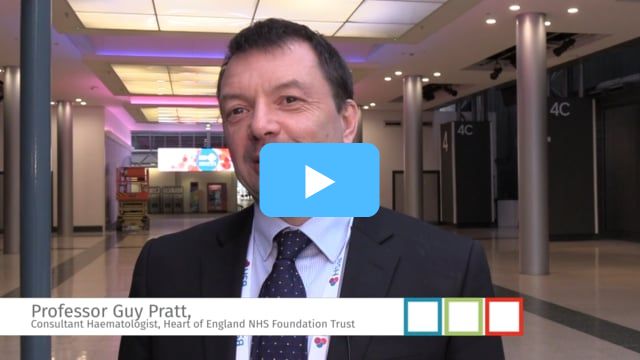Maintenance therapy in newly diagnosed MM – a reality in the UK?

Professor Gordon Cook (Leeds, UK), Professor Guy Pratt (Birmingham, UK) and Professor Graham Jackson (Newcastle, UK) discuss the need for maintenance in the up-front setting for UK patients and the new data on maintenance with the oral proteosome inhibitor ixazomib.
Interviewer: Hannah Chatfield. Article: Maria Dalby.
Maintenance therapy following ASCT has been shown to delay disease progression and prolong survival in MM. The recently completed TOURMALINE-MM3 study was designed to evaluate oral proteasome inhibitor ixazomib as maintenance therapy in this setting.1 The results of TOURMALINE-MM3 were presented by Dr Martin Kaiser(Royal Marsden Hospital and Institute of Cancer Research, London) who emphasised that with its documented efficacy, convenient oral once-weekly dosing and favourable toxicity profile, ixazomib is an “obvious choice” in this setting. TOURMALINE-MM3 included a total of 656 patients who had undergone standard of care induction followed by melphalan at a dose of 200mg/m2 and ASCT, and who were randomised 3:2 to ixazomib or placebo maintenance therapy for 24 months, equivalent to a maximum of 26 cycles or until disease progression or toxicity. The primary endpoint was PFS, with OS as a key secondary endpoint. To be eligible for inclusion patients had to have received a proteasome inhibitor and/or an immunomodulatory drug as induction therapy and achieved at least PR following ASCT. Post-transplant consolidation therapy was not permitted in the study. The most common induction regimen was VCD; of patients who had received an IMiD as induction, 87% had received thalidomide. The primary endpoint of the study was met, as patients receiving ixazomib maintenance therapy had a statistically significant 39% improvement in overall PFS from the time of randomisation compared with patients receiving placebo (HR=0.72; 95% CI 0.58, 0.89; p=0.0023). Median PFS was 26.5 months in the ixazomib maintenance arm compared with 21.3 months in the placebo arm. The PFS benefit of ixazomib was observed across a range of patient subgroups including younger and older patients and patients with standard and high-risk cytogenetics. The PFS benefit of ixazomib was also observed irrespective of MRD status at randomisation. Among patients who were MRD-positive at randomisation, 12% in the ixazomib arm and 7% in the placebo arm achieved MRD negativity during maintenance treatment. Median PFS rates among patients who were MRD-negative at randomisation were 38.6 months in the ixazomib arm versus 32.5 months in the placebo arm; among patients who were MRD-positive at randomisation, the median PFS rates were 23.1 months and 18.5 months in the ixazomib and placebo arms, respectively.
The median follow-up period at the time of the data cut-off was 31 months; at this time median OS had not been reached in either arm. Nearly half of the patients (46%) in the ixazomib arm upgraded their response either from VGPR to CR or from PR to VGPR or CR during maintenance treatment, compared with 32% in the placebo arm (RR=1.41; 95% CI 1.10, 1.80; p=0.0042). Ixazomib maintenance treatment had a favourable overall safety profile with low toxicity. Only 7% of patients in the ixazomib arm had to discontinue treatment permanently due to adverse events, compared with 5% in the placebo arm. The incidence of second primary malignancies was very low at only 3% in each arm. Patients also completed quality of life evaluations using the EORTC QLQ-C30 and EORTC QLQ-MY-20 instruments; these scores show that patients on ixazomib maintenance therapy had a comparable quality of life to placebo patients. The investigators concluded that as the first randomised, double-blind, placebo-controlled study of a proteasome inhibitor for post-ASCT maintenance therapy in MM, the TOURMALINE-MM3 study indicates that ixazomib is a promising new option in this setting.
References
- Dimopoulos MA, Gay F, Schjesvold F, et al. Oral ixazomib maintenance following autologous stem cell transplantation (TOURMALINE-MM3): a double-blind, randomised, placebo-controlled phase 3 trial. Lancet 2019;393:253-264.




